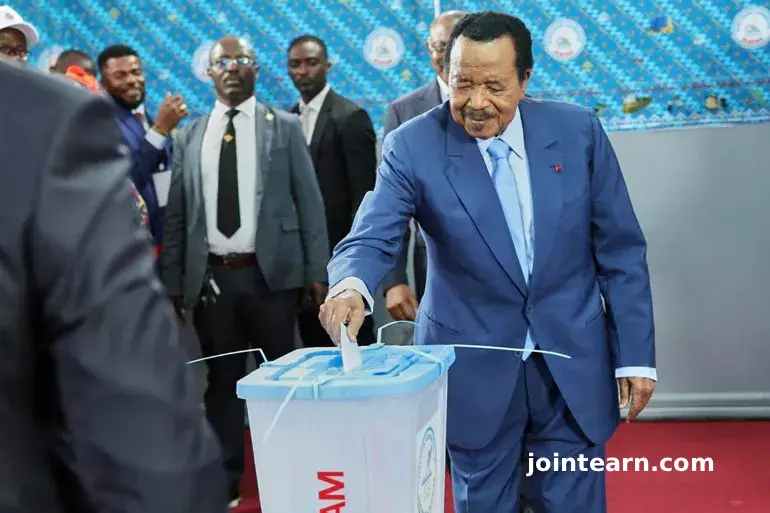
Cameroon’s longtime leader, President Paul Biya, has officially been sworn in for his eighth seven-year term, solidifying his place as the world’s oldest sitting head of state at 92 years old. Biya’s re-election in last month’s Cameroon presidential election 2025 has sparked widespread controversy, with opposition leaders branding the results as fraudulent and unconstitutional.
During his inauguration on Thursday, Biya addressed Parliament, reaffirming his commitment to the Cameroonian people and pledging to foster a “united, stable, and prosperous” nation. The ceremony, however, took place under heightened security in Yaounde, the nation’s capital, which appeared partially deserted amid ongoing tensions.
Controversial Election and Deadly Protests
The October 19 election results ignited violent demonstrations across the country. Authorities have confirmed that at least five people died during the unrest, although civil society groups suggest the actual number could be significantly higher. Protesters have voiced anger over what they perceive as election irregularities, while former minister and opposition candidate Issa Tchiroma declared victory on social media and accused the government of vote manipulation.
A three-day lockdown was imposed in parts of the country following the election, reflecting the government’s attempt to curb escalating tensions. Locals described Yaounde as heavily militarized, with streets largely empty during Biya’s swearing-in ceremony.
Priscilla Ayimboh, a 40-year-old resident of Yaounde, voiced frustration over Biya’s continued leadership:
“I’m tired of Biya’s rule and I no longer care what he does. It’s a pity. I wonder what will become of Cameroon in the next seven years: there are no roads, water, or jobs.”
Political analysts also highlight the deep divisions within Cameroon. Munjah Vitalis Fagha, a senior politics lecturer at the University of Buea, told the Associated Press:
“The inauguration occurs in a tense yet controlled political atmosphere, marked by significant polarization between the ruling elite and a populace increasingly disillusioned with the government.”
Biya’s Record and Governance Challenges
Paul Biya first assumed power in 1982 following the resignation of Cameroon’s first president, Ahmadou Ahidjo. Since then, he has overseen significant political changes, including the 2008 constitutional amendment that eliminated term limits, enabling him to run for multiple terms.
Biya’s leadership has been criticized for contributing to persistent economic stagnation, poor infrastructure, and ongoing security crises, particularly in Cameroon’s Anglophone regions where separatist movements remain active. Analysts suggest that his prolonged tenure has left younger generations — who now make up more than 70% of the nearly 30 million population — feeling disconnected from national governance.
Health concerns surrounding Biya have also been a recurring topic. The 92-year-old president reportedly spends much of his time in Europe, delegating daily administrative responsibilities to senior officials and family members. Should he complete his new term, Biya would leave office close to 100 years of age, further solidifying his reputation as Africa’s longest-serving leader.
Opposition Reaction
The Constitutional Council officially declared Biya the winner on October 27, with 53.66% of the vote. Tchiroma, who came in second with 35.19%, vehemently rejected the results:
“The will of the Cameroonian people was trampled that day, our sovereignty stolen in broad daylight. This is not democracy; it is electoral theft, a constitutional coup as blatant as it is shameful.”
Despite these claims, the government maintains that the election was fair, framing the inauguration as a step toward stability and continuity.
Looking Ahead: Cameroon’s Political Future
Biya’s eighth term represents both a continuation of long-standing policies and a focal point for growing calls for political reform. Security challenges, economic development, and governance transparency are likely to dominate the national agenda, while young Cameroonians increasingly demand meaningful representation and opportunities.
Observers suggest that Cameroon faces a pivotal period in its history: balancing the legacy of its longest-serving president with the urgent need for political renewal and social progress. The world will be watching closely as Biya navigates these complex challenges over the next seven years.


Leave a Reply